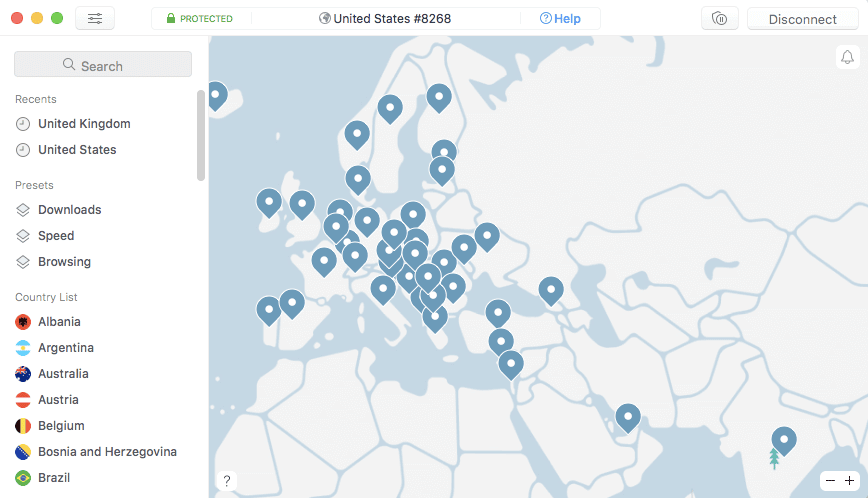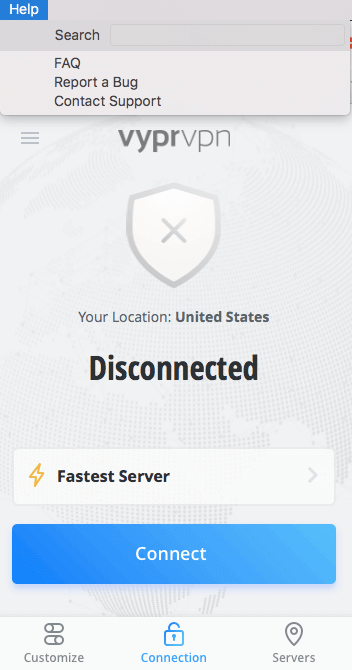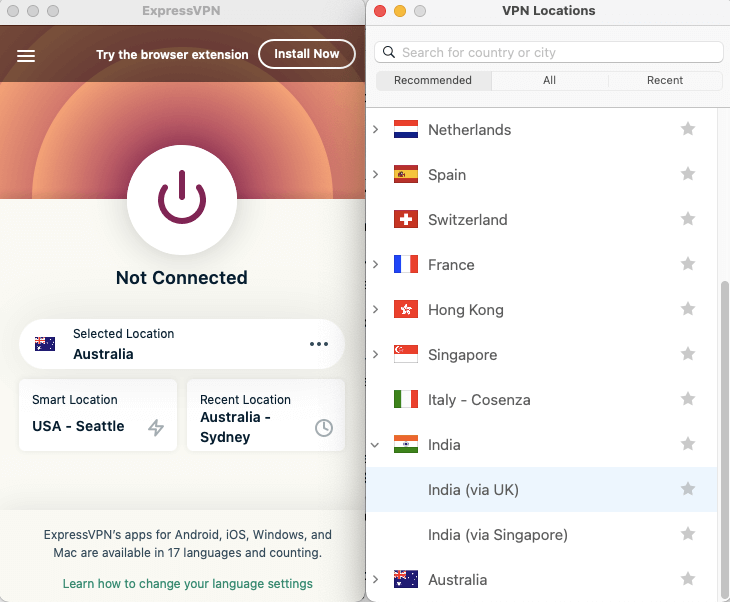
What Is a Virtual Server? 2025 Guide
Quick Answer: What Is a Virtual Server?
A virtual VPN server uses software settings to change where it appears to be located. This lets it provide IP addresses from countries where it could be dangerous to have a physical server. ExpressVPN, my favorite VPN, clearly lists its virtual servers on its website; try it for free with a 30-day money-back guarantee.
What is a virtual server? That’s one of those technical questions that can bog you down in context if you’re not careful. If you’re here, you may be considering a VPN subscription — maybe to a service on my best VPN list — but it involves virtual servers, which you’ve heard are bad news. I’ll try to explain virtual private server technology without starting at the creation of the universe.
The short answer: Having virtual servers doesn’t mean a VPN isn’t safe. Many of my favorite providers, including ExpressVPN and Surfshark, use virtual servers. You can learn more about these VPNs in my ExpressVPN review and Surfshark review. Like any technology, virtual servers have their good and bad sides; today, I’ll tell you everything you need to know to make that VPN decision.
VPN Virtual Server Definition
A virtual server, or virtual machine, is a partitioned space on a computer that provides a service to client computers in the same way a physical server does. In a VPN, a virtual server is most often used to change a server’s IP address to another country. Since your IP address determines what services you can access, this makes the VPN more broadly useful.
For a little context, let’s nail down a definition for “server.” A server is a computer that’s set up to act on requests from other computers, known as clients. One example of a server/client relationship is this page you’re reading right now. When you clicked the link, your computer (the client) asked our server to see the page at this URL, and the server provided it.
As the backbone of the internet, servers have tons of different purposes — but right now, we’re most interested in how they form virtual private networks (VPNs). A VPN is just a bunch of servers you can access (via an encrypted tunnel) to use their IP addresses instead of your own. The VPN servers double as clients, contacting other servers on your behalf.

For all intents and purposes, when you connect to a VPN server, you’re in that server’s location. That’s how you can use a VPN to get Netflix unblocked, bypass a school firewall or find yourself in another country. Sometimes, though, a VPN may want an IP address in a place where it can’t physically add a server. In those cases, it uses a virtual server instead.
How Does a Virtual VPN Server Work?
To build a virtual server, all you need to do is set up a physical server, then divide its software into multiple virtual servers that operate independently. This process, called server virtualization, essentially gives a server multiple personalities.
Each virtual server can run its own operating system, and they can even appear to be in completely different countries. A VPN’s virtual server may be based in disk space rented from another company, but it’s safest when a dedicated physical server — one wholly owned by the VPN provider — is split into multiple virtual machines.

Of course, the server doesn’t physically split. It all happens at the software level. The only program that can see all the segments is the hypervisor, a sort of “federal government” that distributes resources between the virtual servers. Otherwise, for all intents and purposes, multiple computers are sharing one device.
So how can these virtual servers appear to connect from locations where they aren’t actually based? In short, it’s because many IP addresses are linked with real-world locations — that’s how they can be used to track you. The VPN provider splits a virtual server from an existing physical server, then changes its IP address to one that matches the desired country.
Thanks to VPN encryption, anybody who sees the server connect shouldn’t be able to tell where it’s actually based, let alone the location of the client device connecting through it. In the next section, I’ll explain the benefits that make all this trouble worthwhile for a VPN.
How Are Virtual Servers Used?
As we’ve already learned, virtual VPN servers can be used to provide IP addresses in a country without placing a bare-metal server there. Setting up a real server in some locations can be too expensive, too risky or both. If providers want to let users connect through a country and access web services there, a virtual server is often the only choice.
Let’s take India as an example. In 2022, a new law took effect requiring all VPNs operating in India to keep logs and turn them over to the authorities upon request. Instead of complying, every VPN worth its salt shut down its physical servers in India. Some abandoned India altogether, while others added virtual servers there instead.

servers are actually virtual ones in the U.K. and Singapore.
The new virtual servers have Indian IP addresses, but since they aren’t actually in India, the law has no power over them. Same with Russia, China, North Korea, Belarus and all the countries that regulate VPNs as a threat to totalitarian rule. To be frank, if a VPN has a physical server in a country that requires logs, don’t use it — especially not if you’re going to that country IRL.
In other places, there’s no direct risk from the law, but a lack of infrastructure makes it too expensive to build server rooms. If you see locations in Afghanistan, Ukraine, Myanmar or other active conflict zones, they’re almost certainly virtual.
Benefits & Drawbacks of Virtual Servers in VPNs
So virtual servers are a great thing for VPNs, right? Not necessarily. With all this talk of benefits, you may be wondering why top-tier services like NordVPN and Proton VPN refuse to add them (except for NordVPN’s one virtual server in India), even if it leaves them with smaller networks.
Find out why I still think these VPNs are worth your money in my NordVPN review and Proton VPN review. Now, let’s explore some pros and cons of VPN server virtualization.
Virtual Server vs Physical Server Benefits:
- More server locations: In many places across the world, setting up a permanent bare-metal server is expensive, inconvenient or even dangerous. With virtual servers, VPNs can put servers in those places without shouldering the risk. For example, India may be hostile to a free internet, but it still has some banger movies on stream.
- Cheaper to run: Virtual servers don’t need their own hardware or sites — they’re just “ghosts in the machine” of the physical server. VPNs pay a lot less to set up and maintain virtual servers.
- Lower resource costs: The public is growing more aware of the carbon footprint of running servers, especially the energy needed to keep them cool (Bitcoin mining is an egregious example). Less physical hardware means lower emissions overall.
- Better performance through load distribution: Remember the hypervisor program that can see all the virtual environments on a physical device? It can funnel computing resources to the virtual servers that are working harder, which can prevent a server from slowing down if it gets slammed with requests.
- Secure against disasters: A virtual server is easy to back up, so you can store copies of its data on multiple sites. Resources can also migrate to another server on the same physical device. If the VPN provider is diligent about backups, a virtual server can be more resilient against DDoS attacks and real-world disasters than a physical server.
Virtual Server vs Physical Server Drawbacks:
- Unclear physical locations: A VPN server tends to offer faster downloads and lower latencies to users within 500 miles of its real position. If you connect to a server in your area without knowing it’s really on the next continent, your internet speeds will suffer. To avoid nasty surprises, the best VPNs clearly mark which servers are virtual.
- Limited by physical hardware: Load balancing is great for helping virtual servers run faster, but it can only distribute as much power as its physical hardware resources can support. If you run too many virtual servers on a single bare-metal device, they’ll all start to lag, no matter how well you’ve configured your hypervisor.
- Often rented from third parties: Frequently, VPNs in a hurry to expand their server networks will rent space from virtual server hosting companies. Every third party introduced into a security relationship becomes a point of weakness — as an example, the 2018 NordVPN hack was caused by lax security at a third-party data center.
- Hypervisors can be vulnerable: Another potential weak point is the hypervisor itself, which can be hacked like any other online software. A 2021 bug in VMware, one of the most widely used hypervisor apps, went unpatched for two years, during which time a Chinese hacker group is known to have exploited it.
Final Thoughts
In the previous section, I covered some of the reasons why a provider might not want to use virtual private servers. However, I don’t see any of those points as fatal flaws. As long as a VPN is honest about where it gets its server space and which locations are virtual, the benefits greatly outweigh the downsides.
When provided by a VPN that cares about its infrastructure, virtual servers can be a major boon to the user, expanding the server network while cutting down on resource demands overall. I only get suspicious when a VPN relies heavily on virtual servers to pump up its network size at the expense of quality. That’s a sign that it cares more about ad copy than service.
Where do you stand on the physical server vs virtual server debate? Do you prefer VPNs that use them or those that swear they never will? Did I miss anything important about VPN server virtualization? Let’s chat about it in the comments. Thanks for reading!
FAQ: What Is a Virtual Server?
What Is Meant by Virtual VPN Server?
A virtual VPN server is a partitioned segment of a physical server that acts like a separate machine. Virtual VPN servers may have IP addresses that show different locations than the physical servers that host them.What Is the Difference Between a Virtual Server and a Real Server in VPNs?
When a VPN app marks a server as virtual, it usually means that the server’s displayed location is different from its position in the real world. This lets VPNs offer locations in countries like Russia, China and India without having to comply with their VPN laws.What Is a Virtual Server vs Virtual Host?
The difference is the degree of partitioning. Each virtual server acts like a separate computer with a unique IP address. A host is a smaller division that isn’t divided from the other hosts on that server. A server can host several web addresses — some run thousands.

Leave a Reply